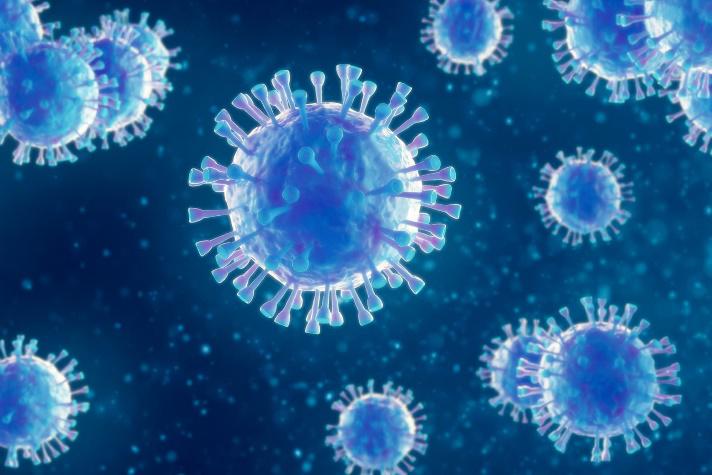1. You May Have a Fever or Chills
A fever is your body's immune response working to fight an intruder, a first line of defense. If you have a temperature that's over 100.4 degrees, it's safe to assume you're ill and safer to assume you have COVID until you are tested and it's proven otherwise, especially if it's accompanied by any of the other symptoms you're about to read about.
2. You May Have a Sore Throat or Cough
A scratchy or swollen throat or a cough—usually dry—can be a key symptom of COVID. "COVID-related sore throats tend to be relatively mild and last no more than five days. A very painful sore throat that lasts more than five days may be something else such as a bacterial infection, so don't be afraid to contact your GP if the problem persists," says the Zoe Symptom Project.
3. You May Have Low Energy or Tiredness
When your body is fighting an illness, it can tire from the fight, sapping you of energy. Listen to it and rest. And pay attention to see if your energy comes back or not. A long-term lack of energy, or fatigue, may be a chronic indicator of a syndrome called "Long COVID," which you'll read more about momentarily.
4. You May Have a Headache
A study just came out about this today in the Journal of Headache and Pain. "Primary headaches get worse after COVID-19," say the researchers. "Headaches related to COVID-19are severe, present as migraine phenotype. Young male patients with COVID-19 tend to have worse headaches."
5. You May Have Nausea
Gastrointestinal issues like nausea, vomiting and diarrhea became known a few months after the pandemic started, as a "respiratory" illness proved to be one that triggered many systems of the body. "It is now clear that not only the lungs, the gastrointestinal tract could also be attacked by SARS-CoV-2. Its host receptor angiotensin-converting enzyme 2 (ACE2), which acts as a gateway to infection, has been found to be highly expressed in the gastrointestinal epithelium and may lead to the development of nausea/vomiting," said a key study last August.
6. You May Lose Your Sense of Smell
"Smell dysfunction is common and often the first symptom of a COVID-19 infection. Therefore, you should self-isolate and get tested for COVID-19 when you can. It is also common in other viral upper respiratory illness, such as the common cold, but rarely is it the only or first symptom in those cases," says the Mayo Clinic. "While the precise cause of smell dysfunction is not entirely understood, the mostly likely cause is damage to the cells that support and assist the olfactory neurons, called sustentacular cells. These cells can regenerate from stem cells, which may explain why smell recovers quickly in most cases."
7. You May Lose Your Sense of Taste
"The loss of smell and taste can also affect our health, causing poor appetite and undesired weight loss. No longer able to enjoy food, patients with anosmia may no longer eat enough, or skip meals altogether. It can even pose an existential threat, by putting us at risk in detecting fires, gas leaks, or spoiled food," says Harvard Health.
8. If You Are Vaccinated, Your Symptoms May Resemble a Common Cold
"Typically, vaccinated people are either asymptomatic or have very mild symptoms if they contract the Delta variant. Their symptoms are more like those of a common cold, such as cough, fever or headache, with the addition of significant loss of smell," says UC Davis. "Most patients hospitalized at UC Davis Medical Center are people who have not received the COVID-19 vaccine. Nationally, 97% of patients hospitalized with COVID-19 are unvaccinated, as of July 22. Vaccines are highly effective at preventing COVID-19 infection and are also effective in fighting against the Delta variant."
9. Dr. Fauci Warns of “Long COVID” Symptoms
Dr. Anthony Fauci, the chief medical advisor to the President and the director of the National Institute of Allergy and Infectious Diseases, has long warned of "people who apparently recover from the actual viral part of it, and then weeks later, they feel weak, they feel tired, they feel sluggish, they feel short of breath." This syndrome is called "post-acute sequelae of SARS-CoV-2 infection, which we're now referring to as 'PASC,' or P-A-S-C," he has said. "It's a chronic projection forward of symptoms, even though the virus is gone, and we think that's probably an immunological effect," he continued. "It's very disturbing, because if this is true for a lot of people, then just recovering from this may not be OK." A study released Thursday in the Lancet proved that these symptoms can last longer than a year, and it's possible that they can last forever.
10. How to Stay Safe Out There
If you feel any of the symptoms mentioned here, get tested for COVID. And follow Fauci's fundamentals and help end this pandemic, no matter where you live—get vaccinated ASAP; if you live in an area with low vaccination rates, wear an N95 face mask, don't travel, social distance, avoid large crowds, don't go indoors with people you're not sheltering with (especially in bars), practice good hand hygiene, and to protect your life and the lives of others, don't visit any of the places you're most likely to catch COVID.
Source: www.msn.com








